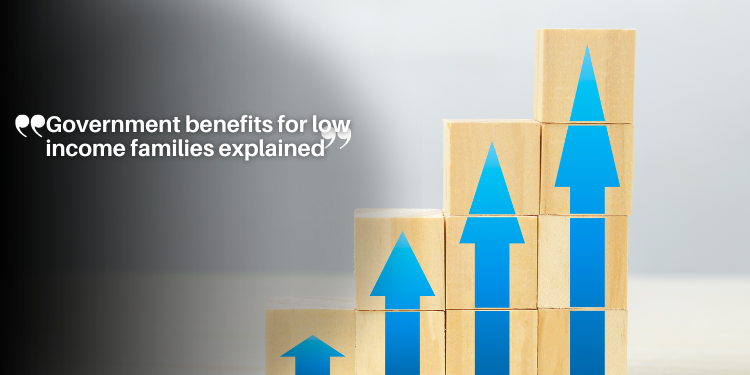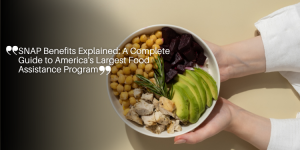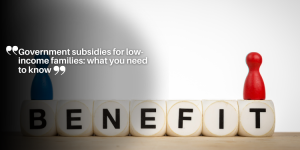Government benefits for low income families explained

Government benefits for low income families include cash assistance, food support, healthcare coverage, and childcare assistance, aimed at alleviating financial strain and improving the quality of life.
Government benefits for low income families play a vital role in making life a little easier for those who need it most. Have you ever wondered what kinds of support are available? Let’s dive into these important resources.
Understanding government benefits
Understanding government benefits can be a game-changer for many families. These benefits are designed to assist those who may be struggling financially. They can help cover essential expenses and provide a safety net in difficult times.
What Are Government Benefits?
Government benefits are various forms of financial assistance provided by local, state, or federal governments. They can take many shapes, including cash assistance, food stamps, and healthcare supports. Knowing what is available is the first step toward using these resources effectively.
Types of Benefits Available
- Cash Assistance: Direct monetary support for families in need.
- Food Assistance: Programs like SNAP help ensure access to nutritious food.
- Healthcare Support: Medicaid and other health programs provide critical services.
- Childcare Assistance: Financial help for families to access quality childcare.
Each of these types of benefits serves a unique purpose and can significantly relieve financial pressure. For instance, food assistance programs help families put meals on the table while cash assistance can help cover rent or utilities.
Eligibility requirements for these benefits vary. Some programs require household income documentation, while others may have specific criteria based on family size or employment status. Navigating these rules can feel overwhelming, but resources are available to help you understand your eligibility.
How to Apply for Assistance
Applying for government benefits often involves filling out forms and providing documentation of your financial situation. Many services now offer online applications, making it easier to submit your information from home.
Ensure that you have all necessary documents ready, such as ID, income statements, and housing information. Take your time to fill out the applications to avoid mistakes that could delay your benefits.
Types of benefits available
There are many types of government benefits available that can provide vital assistance to low-income families. Each type is designed to address specific needs, making it essential to understand what is offered. Let’s explore some of the most common benefits.
Cash Assistance
One of the most direct forms of support is cash assistance. This program provides families with regular payments to help cover basic needs like housing and utilities. This safety net can be crucial in tough times, giving families breathing room.
Food Assistance
- Supplemental Nutrition Assistance Program (SNAP): Helps families purchase food.
- Women, Infants, and Children (WIC): Provides nutritious foods and education for new mothers and their children.
- School Meal Programs: Ensures children receive healthy meals at school.
- Summer Food Service: Offers meals for kids during summer breaks.
Food assistance programs are designed to help ensure that families can put healthy meals on the table. These programs can reduce hunger and improve nutrition among low-income households.
Healthcare Support
Healthcare can be a significant expense, which is why programs like Medicaid are critical. They offer low-cost or free healthcare coverage, ensuring that families have access to doctors and medications without the burden of high costs. Understanding these programs is essential for maintaining health and wellbeing.
Childcare Assistance
Childcare can be expensive, and government programs can help ease this burden. These programs can provide financial assistance for families to access quality childcare services, allowing parents to work or pursue education while ensuring their children are well cared for. Continuous support in childcare is vital for working families.

Eligibility requirements
Understanding the eligibility requirements for government benefits is essential for families seeking assistance. These requirements help determine who can receive the support they need. Each program has its own set of criteria that applicants must meet.
Income Guidelines
One of the most significant factors in qualifying for assistance is income. Most programs establish an income limit based on family size. When determining eligibility, applicants must provide documentation, such as pay stubs or tax returns, to demonstrate their financial situation.
Family Size Considerations
- Smaller families typically have lower income thresholds.
- Larger families often have higher limits to accommodate additional needs.
- Childcare assistance may take into account the number of children in the home.
- Health insurance programs may adjust eligibility based on household size.
It’s crucial to be aware of how family size impacts the income limits set by programs. This adjustment ensures that assistance is available to families who need it most.
Other Factors
Other criteria may also affect eligibility. For instance, some programs may require applicants to be working or looking for work. Certain assistance, like food stamps, may include residency requirements, meaning applicants must live in the area where they are applying for benefits. Identifying these details can greatly influence the application process.
It’s beneficial for applicants to gather all necessary documents and be prepared for a potential interview regarding their situation. By understanding these eligibility requirements, families can better navigate the system and increase their chances of receiving the help they need.
How to apply for assistance
Applying for government benefits can seem daunting, but breaking it down into steps makes the process more manageable. Knowing how to apply is crucial for families seeking support. Start by identifying which benefits you need based on your situation.
Gather Necessary Documents
Before you apply, gather the documents you will need. This typically includes:
- Identification documents, such as a driver’s license or Social Security card.
- Proof of income, like pay stubs or tax returns.
- Housing information, such as rent or mortgage statements.
- Any other relevant financial documents.
Having these documents ready can expedite the application process and help ensure that you provide all necessary information.
Online vs. In-Person Applications
Many programs allow you to apply online, which can make the process easier and quicker. Visit your state’s website to find information about the benefits you want to apply for. Some families may prefer to apply in person, especially if they need assistance filling out the forms. Local community centers or government offices can provide help.
Filling Out the Application
When filling out the application, be thorough and honest. Omitting information may delay processing or lead to denial of services. Make sure you double-check all details before submitting your application.
After submission, keep a copy of your application and any important documents. This will help you track your progress and follow up if necessary. If you don’t hear back within the expected timeline, don’t hesitate to reach out to inquire about your application status. Understanding how to navigate this process can empower families in need to secure the support they deserve.
FAQ – Frequently Asked Questions About Government Benefits for Low Income Families
What types of government benefits are available for low-income families?
Low-income families can access various benefits like cash assistance, food support programs, healthcare coverage, and childcare assistance.
How can I determine if I’m eligible for government benefits?
Eligibility is usually based on factors like income level, family size, and residency. It’s important to check specific criteria for each program.
What documents do I need to apply for assistance?
Common documents include identification, proof of income, housing information, and any other relevant financial records.
Can I apply for government benefits online?
Many programs offer online applications, but some may also require in-person visits, especially if you need help filling out forms.







